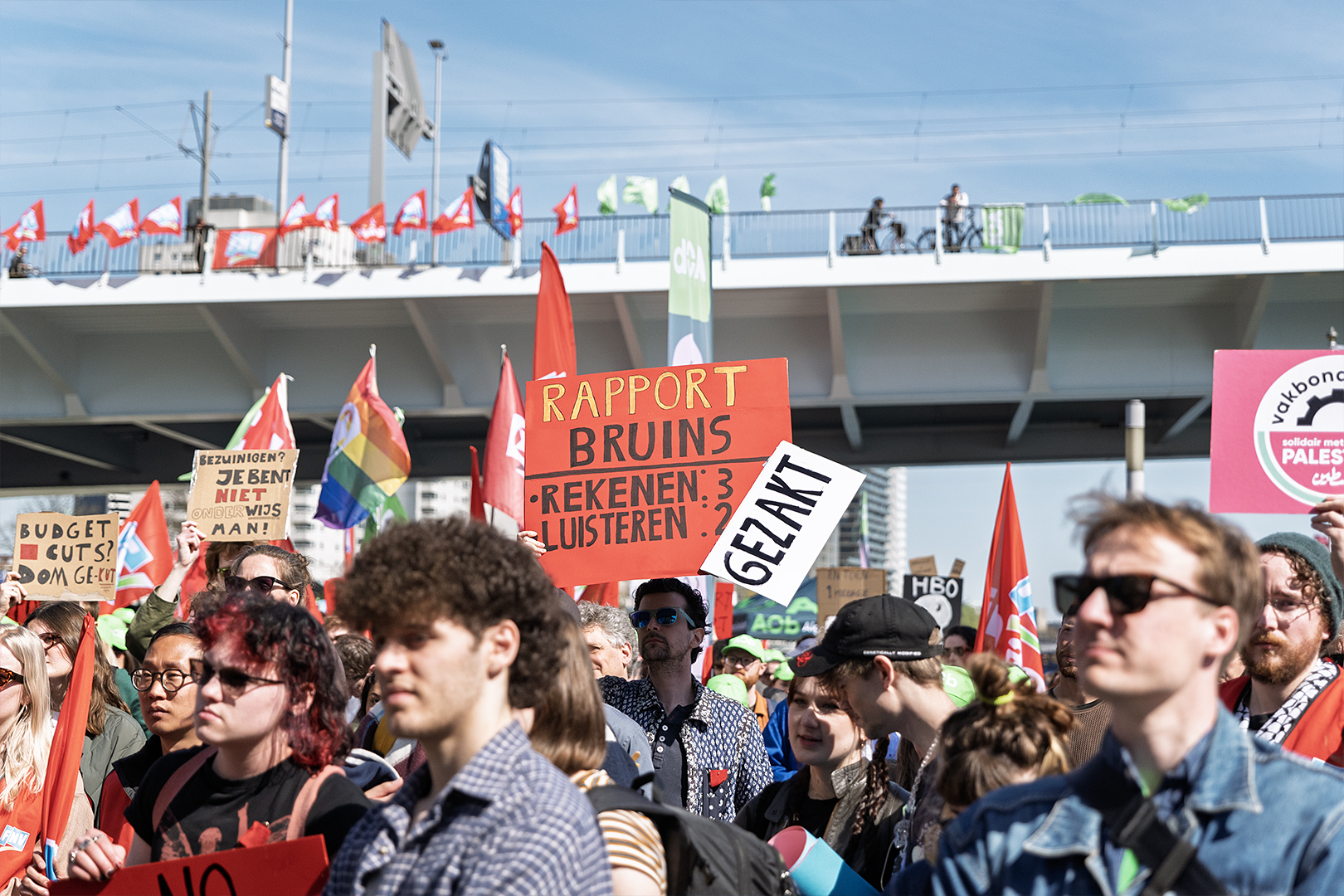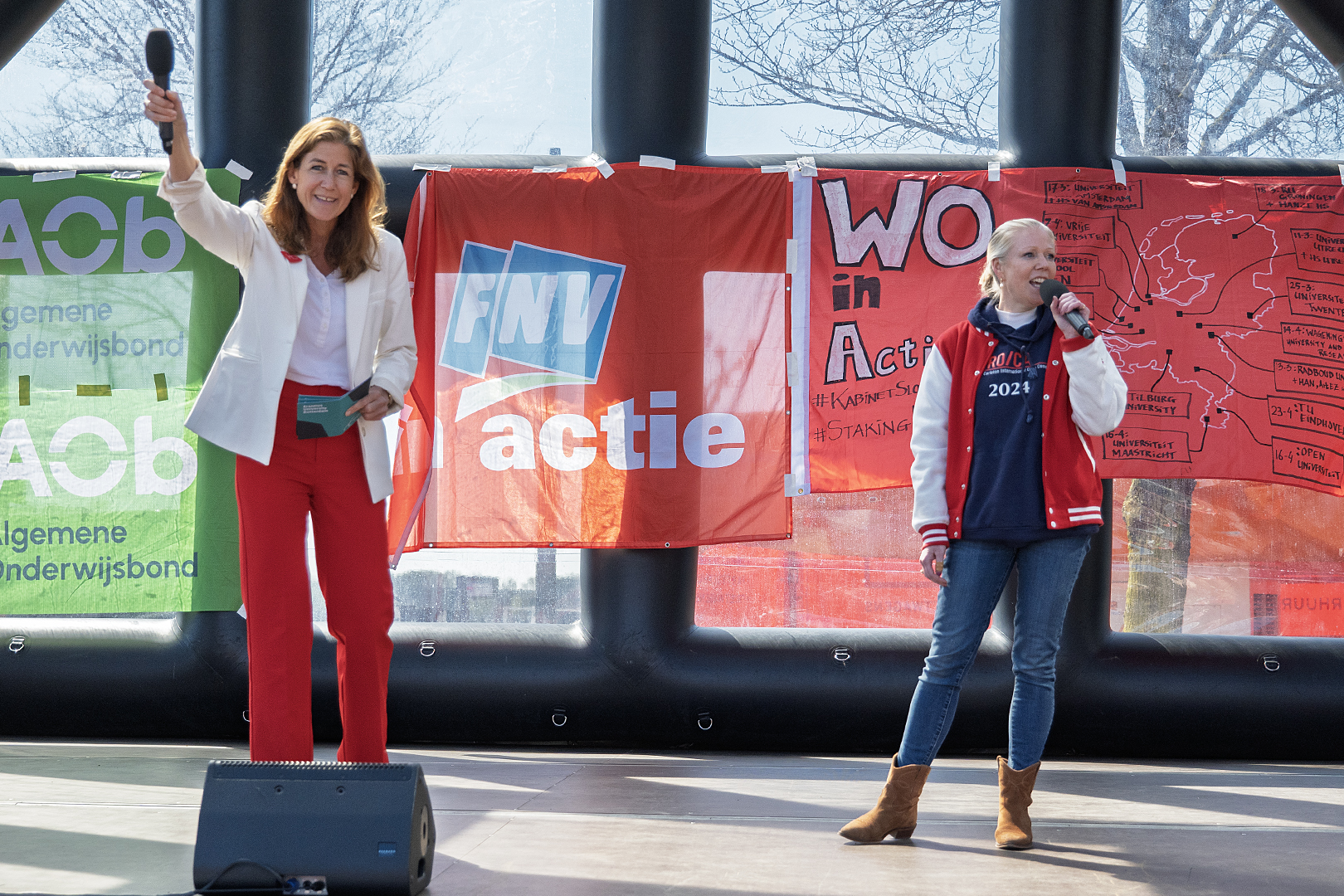‘Don't cut our future' and 'Education is a right'. Some of the many protest signs on display during the education strike. Several thousand students, staff and lecturers from Rotterdam's higher education sector gathered on the Willemsplein around midday to protest against the government's cuts to education. There was sunshine, free chips and a lot of togetherness.
The strike on 8 April is part of a relay strike against the cuts in higher education organised by the teachers' union AOb, the students' unions and the FNV. In total, around 25,000 students, lecturers and university staff have already gone on strike across the country against cuts of more than 1 billion euros. Yesterday's strike in Rotterdam was the eighth.

Mara - armed with a flag and chips - is a student at the RUAS Teacher Training programme. Having arrived early at the Erasmus University campus, where preparations were underway. “I'm on strike today because the cuts directly affect my profession, because I'm going to be a teacher. Lecturers are being cut. Larger classes mean less attention to the individual. So the quality of education is deteriorating.”
Pepijn, principal lecturer, feels that the contribution of education to society is being questioned. According to him, only the costs are considered and not the benefits. “We as lecturers are not listened to and not taken seriously. We are trying to develop the future through the transfer of knowledge, with the aim of giving our students, our young people, a better life.”
Investing in the future
Speakers included national and local politicians, trade union representatives and students. Said Kasmi, alderman, spoke out strongly against the government's policy. “Look at all the unrest and turmoil in the world. Investing in education is an investment in the future, not only of our city, but also of the Netherlands. It is illogical to start cutting back. We desperately need all these well-educated students: we have a huge shortage of staff in healthcare, education and engineering. As far as I am concerned, we should not cut back, but rather invest in the future, in education.”

Fighting together
After the political representatives, it was the turn of the Annelien Bredenoord, President of the Erasmus University Rotterdam and Sarah Wilton-Wels, Chair of the Executive Board at Rotterdam University of Applied Sciences to address the strikers.
Bredenoord emphasised the unity of the higher education institutions, both during the protests of the past months and for the time to come. The Netherlands will feel the impact if the axe falls on the future of our higher education, our knowledge economy and our capacity for innovation," she said. “Innovation is mentioned no less than 85 times in government policy as a solution to the big problems of our time: housing, healthcare, climate, but also security, resilience and the future of our democracy. And this is where cuts are being made. We are seriously concerned about this.”
Wilton-Wels agreed. We are fighting together, for higher education, for research. For all those jobs where people are asking for higher education graduates, for researchers, for scientists. The Port of Rotterdam has 7,000 vacancies and what does this government want to do? To cut education, research and innovation. Unimaginable.

Equality of opportunity
Wilton-Wels also pointed to equality of opportunity, access to education, which is under pressure from cuts. “In Rotterdam, where we now stand at the bridge between north and south, everyone deserves equal opportunities. In the Netherlands, everyone deserves equal opportunities. We are far from achieving this goal. All young people with dreams have the right to education. Don't do it!”
This call - 'don't do it' - was shouted loudly by the strikers. And it was also directed at the Upper House, which voted on the education budget on Tuesday. This was followed by a march through the city centre and teach-outs in various parts of the city.
